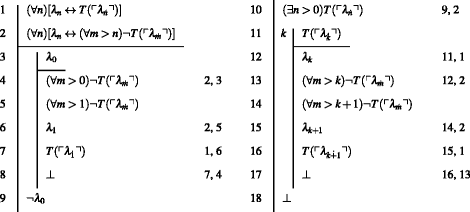Abstract
In a recent paper (Cieśliński and Urbaniak 2012), Urbaniak and Cieśliński describe an analogue of the Yablo Paradox, in the domain of formal provability. Just as the infinite sequence of Yablo sentences inherit the paradoxical behavior of the liar sentence, an infinite sequence of sentences can be constructed that inherit the distinctive behavior of the Gödel sentence. This phenomenon—the transfer of the properties of self-referential sentences of formal mathematics to their “unwindings” into infinite sequences of sentences—suggests a number of interesting logical questions. The purpose of this paper is to give a precise statement of a conjecture from Cieśliński and Urbaniak (2012) regarding the unwinding of the Rosser sentence, and to demonstrate that this precise statement is false. We begin with some preliminary motivation, introduce the conjecture against the background of some related results, and finally, in the last section, move on to the proof, which adapts a method used by Solovay and Guaspari.
Similar content being viewed by others
Notes
Essentially:

How to make this statement precise is (part of) the subject of a recent paper in this journal, [6], where the general form of this operation is called “unwinding”.
For the sake of notational brevity, we’ll actually work in a p.r. extension (in the sense of Feferman [2]) of Peano Arithmetic, which we will denote by ‘ PA’. p.r. extensions of Peano Arithmetic are conservative both in the sense that they prove no sentence in the language of pure arithmetic not already proved by Peano Arithmetic, and in the sense that each of their sentences is PA-provably equivalent to a sentence in the language of pure arithmetic.
Where Pr PA x) is a standard provability predicate in the sense of Feferman, and \(\underline {\neg }\) is a function symbol expressing a primitive recursive function mapping (codes of) sentences to (codes of) their negations.
We use standard notation here, so that 1. for each n, \(\bar {n}\) is an abbreviation for the result of prefixing the successor symbol to the numeral ‘0’ n times 2. for each formula ϕ, \(\ulcorner \phi \urcorner \) is an abbreviation, in the metatheory, for \(\bar {n}\) where n is the Gödel code of ϕ 3. for each formula ψ(v), \(\ulcorner \psi (\dot {x})\urcorner \) is a abbreviation for the function symbol representing the function mapping n to \(\ulcorner \psi (\bar {n})\urcorner \).
In each case, the result of erasing superscripts from one of these results is a standard theorem about the corresponding self-referential sentence.
See [5, p81].
Although deep incompletenesses are hidden here, by the outwardly shining and frictionless operation of the provability operator. For any two consistent effectively axiomatizable theories S,T, with S 1-consistent, containing PA, there exist a pair of PR-formulas τ,τ′ defining axiomatizations of T such that \(S\nvdash \Pr _{\tau }(x)\leftrightarrow \Pr _{\tau '}(x)\), where Prτ, Prτ′ are standard provability predicates in the sense of Feferman.
This is in stark contrast to the situation with the Gödel sentence, where any two sentences equivalent to their own unprovability (in the sense of a fixed predicate Pr) are always equivalent to one other—a fact that can be established in GL, in the sense that if \(\boxdot P\) abbreviates P∧□P, then \(\mathsf {GL}\vdash \boxdot (A\leftrightarrow \neg \Box A)\land \boxdot (B\leftrightarrow \neg \Box B)\rightarrow A\leftrightarrow B\). In fact, this is a theorem of K4.
This is overkill, of course. It would be enough to enumerate one such sentence before all of its negations.
References
Cieśliński, C., & Urbaniak, R. (2012). Gödelizing the Yablo sequence. Journal of Philosophical Logic, 43. doi:10.1007/s10992-012-9244-4. http://link.springer.com/journal/10992/onlineFirst/page/1.
Feferman, S. (1960). Arithmetization of metamathematics in a general setting. Fundamenta Mathematicae, 49, 35–91.
Guaspari, D., & Solovay, R.M. (1979). Rosser sentences. Annals of Mathematical Logic, 16, 81–99.
Leach-Krouse, G. (2011). Yablo’s paradox and arithmetical incompleteness. arXiv.org preprint arXiv:1110.2056.
Lindström, P. (1997). Aspects of incompleteness: Lecture notes in logic 10. New york: Springer.
Rabern, B., Rabern, L., Macaulley, M. (2012). Dangerous reference graphs and semantic paradoxes. Journal of Philosophical Logic. doi:http://dx.doi.org/10.1007/s10992-012-9246-2.
Acknowledgments
Thanks to Chris Porter and an anonymous reviewer for helpful comments and editorial suggestions; thanks to Tim Bays, Mic Detlefsen, Curtis Franks, Chris Porter, Tony Strimple and Sean Walsh for invaluable discussion and advice. This research was partially funded by EMSW21-RTG-0838506.
Author information
Authors and Affiliations
Corresponding author
Rights and permissions
About this article
Cite this article
Leach-Krouse, G. Yablifying the Rosser Sentence. J Philos Logic 43, 827–834 (2014). https://doi.org/10.1007/s10992-013-9291-5
Received:
Accepted:
Published:
Issue Date:
DOI: https://doi.org/10.1007/s10992-013-9291-5




